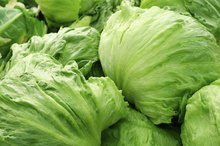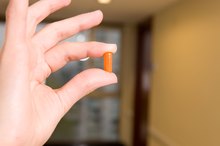Fruits Containing Vitamin B
Fruits are an essential part of any healthy diet because they supply several key nutrients such as vitamin C and potassium. These nutritious foods also supply varying amounts of the eight B vitamins you need for energy production. The exact content of each B vitamin is different depending on what fruit you eat, and some fruits are better sources than others.
Thiamin for Thinking
Thiamin, or vitamin B-1, is crucial for the function of your brain and plays a role in nerve transmission throughout the body. Women need 1.1 milligrams per day, while men require 1.2 milligrams. Enriched grains, meat, eggs, nuts, seeds and legumes are the best sources of niacin, but a 6-ounce serving of grapefruit juice supplies 0.3 milligram, which is 27 percent of the dietary reference intake for women and 25 percent for men. Pineapple and orange juice provide trace amounts, as well.
Riboflavin for Red Blood Cells
Fruits That Do Not Contain Folate
Learn More
Women need 1.1 milligrams of riboflavin, or vitamin B-2, each day, and men require 1.3 milligrams. This vitamin is essential for the production of red blood cells. Eggs, meat, dairy foods, legumes, nuts and leafy green vegetables are the best food sources of riboflavin, but a few fruits supply small amounts, too. A cup of prunes, for example, provides 0.25 milligram -- 23 percent of the DRI for women and 19 percent for men. Grape juice, prune juice, grapefruit juice and raisins deliver tiny doses, as well.
Niacin for Nerves
Niacin, or vitamin B-3, is essential for the proper function of your nerves, and women need 14 milligrams each day, while men should have 16 milligrams. Meat, eggs, beans, enriched grains and nuts are top sources of the vitamin, but a cup of dates supplies 2.2 milligrams. This is 16 percent of a woman's DRI and 14 percent of a man's. Prune juice, prunes, peaches, nectarines and orange juice are additional fruit sources.
Pantothenic Acid to Produce Hormones
What Vitamins Do Mangoes Have?
Learn More
Also called vitamin B-5, pantothenic acid helps your body produce and release hormones normally. Adequate intake of pantothenic acid is 5 milligrams per day. Meat, eggs, potatoes and leafy green vegetables are good sources of pantothenic acid. A 6-ounce serving of grapefruit juice supplies 1.3 milligrams of the nutrient, 26 percent of the DRI. Orange juice is another source.
B-6 for Brain and Blood
Your brain and blood rely on plenty of vitamin B-6, and adults need between 1.3 and 1.7 milligrams per day, depending on age. A medium-sized banana delivers 0.4 milligram, and a 1/2-cup serving of raisins supplies 0.1 milligram. Watermelon is another fruit source of vitamin B-6.
Trace Amounts
Some fruits contain trace amounts of a B vitamin but aren't significant sources. Also called vitamin B-7, biotin plays an essential role in human growth, and adequate intake for adults is 30 micrograms per day. Bananas, orange juice, raspberries and strawberries supply trace amounts, as well. Folate, also called vitamin B-9, plays a crucial role in DNA production and cell division, which makes it essential during pregnancy. Adults need 400 micrograms of folate each day, and pregnant women require a daily dose of 600 micrograms. A 3/4-cup serving of orange juice supplies 35 micrograms, and a small orange provides 29 micrograms. Papaya, bananas and cantaloupe are fruit sources of folate, too. There are no fruit sources of vitamin B-12, which is only found in animal products and fortified foods.
Related Articles
References
Resources
Writer Bio
Sara Ipatenco has taught writing, health and nutrition. She started writing in 2007 and has been published in Teaching Tolerance magazine. Ipatenco holds a bachelor's degree and a master's degree in education, both from the University of Denver.









